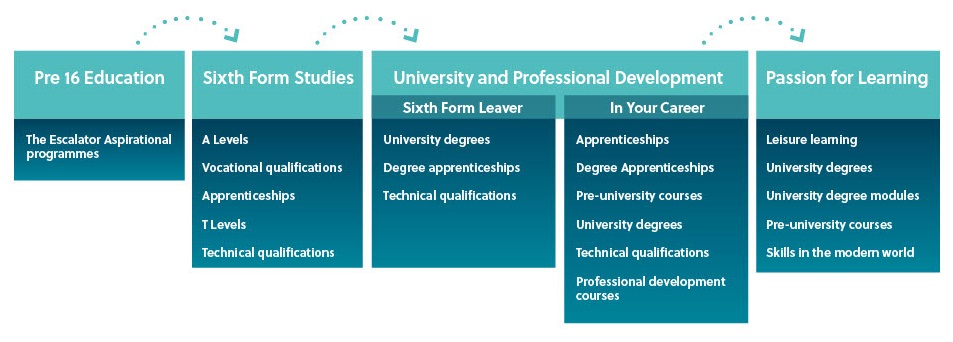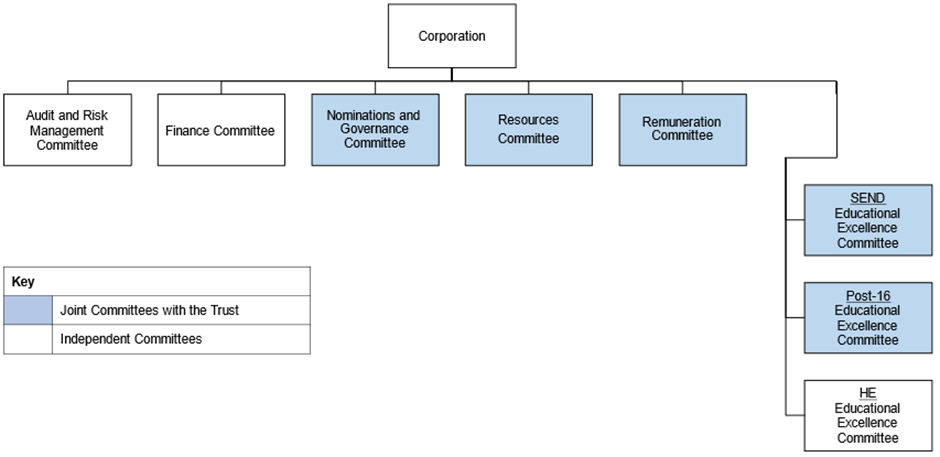Overview of College Governance
Colleges exist to advance education for the public good.
Colleges provide high-quality technical and professional education and training for young people, adults and employers. They prepare students with valuable skills for the workplace, helping to develop their career opportunities and strengthen the local, regional and national economy. Colleges are inspirational places to learn because education and training is delivered by expert teaching staff in industry-standard facilities. From basic skills to postgraduate degrees, colleges offer first rate academic and vocational teaching, in a range of professions including engineering, hospitality, IT, construction and the creative arts. They offer a range of qualifications and training including:
-
A Levels
-
Apprenticeships
-
Traineeships
-
Vocational qualifications
-
Higher education
-
Entry level training
Colleges are established under the Further and Higher Education Act 1992 for the charitable purpose of ‘advancing education’.
The Corporation is the legal entity that operates the College, and the College is an activity through which the Corporation achieves its charitable purpose.
The Corporation’s core functions are to:
-
determine and develop the College’s educational character
-
set and communicate the College’s strategy and goals
-
hold the Executive leaders to account for the educational performance and quality of the College, and for the performance of staff
-
exercise effective control to ensure that funds and assets are protected, the College remains solvent and its legal obligations are met
The main duties of governance members of the Corporation under charity law are to:
-
Ensure the Corporation carries out its purpose for the public benefit
-
Comply with the Corporation’s governing document and the law
-
Act in the Corporation’s best interests
-
Manage the Corporation’s resources responsibly
-
Act with reasonable care and skill
-
Ensure the Corporation is accountable
About West Suffolk College
West Suffolk College (WSC) is a leading further education college in the east of England. WSC has multiple adult centres across the east of England to support:
-
basic qualifications (from Entry Level and beyond)
-
university qualifications (from Levels 4, 5 and 6) with leading education partners including University of East Anglia, University of Suffolk, and Pearson
-
industry specific skills (short courses to support their progression whilst in-work)
-
tailored programmes to support requalification or re-entry into the workplace
-
hobby based skills (i.e. pottery, baking, arts, etc.)
WSC also sponsors the Eastern Education Group Trust (the “Trust”), a nationally recognised multi-academy trust operating across the east of England, with headquarters in Bury St Edmunds.
Established in 2015, the Trust currently includes one primary school, five specialist SEN schools and two sixth form colleges:
-
Abbeygate Sixth Form College in Bury St Edmunds
-
Chalk Hill in Sudbury
-
Duke of Lancaster School in Fakenham
-
Exning Primary School in Newmarket
-
One Sixth Form College in Ipswich
-
Priory School in Bury St Edmunds
-
Stone Lodge Academy in Ipswich
-
Sunrise Academy in Lowestoft
Mission, Vision and Strategy
WSC and the Trust operate under a collaboration agreement and have a strategic alliance to work together as the Eastern Education Group (the “Group”).
The Group has a common vision “deliver a world-class, inspirational life-long learning journey that drives prosperity and well-being for all in our communities. At the heart of this is progression and supporting students to the next stages of their lives by focusing on:

Alongside their aspirations, learners have personal, practical realities that can become barriers for learning. Everything is underpinned by our wraparound support that helps address challenges and find solutions so that no student is left behind through circumstances that are beyond their control.”
Our Group approach focuses on joining up education by looking at commonality and areas for collaboration (removing inefficient competition and focusing on best practice to benefit all) to best support students and efficiently pool resources and expertise, to provide outstanding vocational and academic education to students throughout their lifetime across the east of England.
The Eastern Education Group helps shape and deliver education from primary through to those accessing University, Apprenticeships (higher and degree) and professional development in the workplace. We also support those people who simply have a passion for learning.
Our aspirational primary and secondary school programmes, the Escalator programmes, help bring together education at all levels and engage hundreds of young people each year. At Sixth Form and Higher Education, we directly enable over 15,000 students across the region to access the courses and connections they need to give them unparalleled regional, national and global opportunities.

Operational Structure
Since establishing the Trust, WSC and the Trust have operated with a common CEO, CFO and Clerk. This has progressed in the fullness of time, leading to an ever more efficient and agile Group. Group leads and their specialist teams now oversee central infrastructure functions, and teaching and learning staff across the Group regularly work together to share and implement the latest evidence-based practice to improve teaching and standards for all. We now operate as one Group institution with multiple sites.
The Corporation recognises the value of the Group and in July 2022 noted “the coincidence of interest (public benefit) between the College and Suffolk Academies Trust” and “the substantive benefit of working in collaboration to achieve our common charitable object – the advancement of education for the public benefit”.
Governance Structure
The governance structures of WSC’s Board (Corporation) and the Trust’s Board and have been closely aligned to maximise our impact to the Trust as its sponsor and to best support our strategic alliance.
The Corporation and Trust Board have a similar governance structure and operate with common Chairs and Vice Chairs across the Boards and some Committees, and the consider common agendas and KPIs. The Corporation and Trust Board also operate several joint Committees populated by members from both the Corporation and Trust’s governance, and with a Group-wide remit: the Post-16 Educational Excellence Committee and Resources Committee (as of November 2023), the Nominations and Governance Committee and Remuneration Committee (as of March 2024), and the SEND Educational Excellence Committee (as of September 2024). The joint Committees are advisory to the legally distinct Corporation and Trust Board.
The Corporation operates the following governance structure:

Terms of Reference
Audit and Risk Management Committee
Finance Committee
Apprenticeship and HE Educational Excellence Committee
Nominations and Governance Committee
Post-16 Educational Excellence Committee
Remuneration Committee
Resources Committee
SEND Educational Excellence Committee
Whilst the Corporation has ultimate responsibility for all governance matters, in accordance with its Instrument and Articles of Government it may delegate certain responsibilities. Detailed information on how the Corporation delegates its responsibilities; the roles of Governors and Committee members, Executive and the terms of reference of the Corporation and its Committees can be found in the Corporation’s Standing Orders and Scheme of Delegation.
In addition to Governors and Committee members, the Corporation also has Governor Leads (responsible for oversight of a key statutory responsibility such as Safeguarding).
Governance Meetings
Key Policies
- Appointment and Term of Office Policy
- Code of Conduct
- Financial Regulations
- Scheme of Delegation
- Standing Orders
Role Descriptors
- Chair of the Corporation
- Vice Chair(s) of the Corporation
- Governor
- Staff Governor
- Committee Member
- Student Governor
Key Information
|
|
Purpose / Summary |
Mandatory / Advisable |
|
Describes the governance framework and requirements of the College. |
Mandatory reading |
|
|
WSC's Code of Conduct and Role Descriptions (above) |
Describes the standards of conduct and accountability which are expected of Governors and Committee members, including any legal and ethical duties. |
Mandatory reading |
|
(also known as the Nolan Principles) Describes the principals by which all people involved in governance must uphold. |
Mandatory reading |
|
| Key Policies (above) | Describes the governance structure of the College and how responsibility is delegated. | Mandatory reading |
|
Describes the legal and regulatory requirements that apply to FE corporations as charities providing education. It also summarises recommended practice for effective governance. |
Mandatory reading |
|
|
Describes the governance responsibility to safeguard and promote the welfare of children |
Mandatory reading |
|
|
Describes the outcome of Ofsted inspections including their judgements on (1) quality of education, (2) behaviour and attitudes, (3) personal development, (4) leadership and management; and areas for development. |
Mandatory reading |
|
|
WSC’s Annual Self-Assessment Report and Quality Improvement Plan |
Describes the College’s academic quality and outcomes for the previous academic year and the areas for further development for the current academic year. |
Mandatory reading |
|
Describes the governance and financial responsibilities of Colleges |
Mandatory reading |
|
|
Describes the College’s financial accounts for the previous academic year and summarises the College’s performance, objectives and strategy, and its compliance. |
Mandatory reading |
|
|
Describes the process of Ofsted inspections including the method by which it makes its judgements on (1) quality of education, (2) behaviour and attitudes, (3) personal development, (4) leadership and management; and areas for development. |
Advisable reading |


